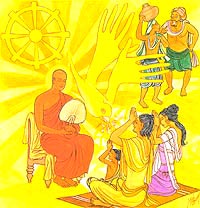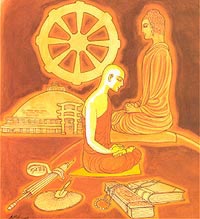26912 Wednesday and 27912 Thursday LESSON 711 FREE ONLINE eNālāndā Research and Practice UNIVERSITY through http://sarvajan.ambedkar.org Dhammapada Verse 363 Kokalika Vatthu The Ideal Monk Dhammapada Verse 364 Dhammaramatthera Vatthu Verse 364. The Monk Abides in Dhamma
Verse 363. The Ideal Monk
Whatever bhikkhu tongue-controlled
speaks wisely and who is not proud,
who theory and practice can expound,
sweet as honey is his speech.
Explanation: The monk who controls his speech, who speaks
wisely with his mind composed, who explains the meaning of the Dhamma
- sweet are the words of that monk.
Dhammapada Verse 363
Kokalika Vatthu
Yo mukhasamyato bhikkhu
mantabhani anuddhato
attham dhammanca dipeti
madhuram tassa bhasitam.
Verse 363: The bhikkhu who controls his mouth
(speech) who speaks wisely with his mind composed, who explains the meaning and
the text of the Dhamma, — sweet are the words of that bhikkhu.
The Story of Bhikkhu Kokalika
While residing at the Jetavana
monastery, the Buddha uttered Verse (363) of this book, with reference to
Bhikkhu Kokalika.
Bhikkhu Kokalika had abused the
two Chief Disciples, the Venerable Sariputta and the Venerable Maha Moggallana.
For this evil deed Kokalika was swallowed up by the earth and had to suffer in Paduma
Niraya. Learning about his fate, the bhikkhus remarked that Kokalika had to
suffer grievously because he did not control his tongue. To those bhikkhus, the
Buddha said, “Bhikkhus! A bhikkhu must have control over his tongue; his
conduct must be good; his mind must be calm, subdued and not flitting about as
it pleases.”
Then the Buddha spoke in verse as
follows:
Verse 363: The bhikkhu
who controls his mouth (speech) who speaks wisely with his mind
composed, who explains the meaning and the text of the Dhamma, —
sweet are the words of that bhikkhu.
Verse 364. The Monk Abides in Dhamma

Verse 364. The Monk Abides in Dhamma
The bhikkhu who in Dhamma dwells,
in Dhamma delighting and pondering,
remembering the Dhamma - he
does not decline from Dhamma True.
Explanation: The monk who abides in the Dhamma, who delights
in the Dhamma, and is ever mindful of the Dhamma, does not fall away
from the Dhamma of the virtuous.
Dhammapada Verse 364
Dhammaramatthera VatthuDhammaramo dhammarato
dhammam anuvicintayam
dhammam anussaram bhikkhu
saddhamma1 na parihayati.Verse 364: The bhikkhu who abides in the
Dhamma, who delights in the Dhamma, who meditates on the Dhamma, and is ever
mindful of the Dhamma, does not fall away from the Dhamma of the virtuous1.
1. saddhamma: the Dhamma of the virtuous; i.e.,
the thirty-seven Factors of Enlightenment (Bodhipakkhiya Dhamma) and the nine
Transcendentals (Lokuttara Dhamma).
The Story of Thera Dhammarama
While residing at the Jetavana
monastery, the Buddha uttered Verse (364) of this book, with reference to Thera
Dhammarama.When it was made known to the
disciples that the Buddha would realize Parinibbana in four months’ time, most
of the puthujjana bhikkhus (i.e., those who had not attained any of the Maggas)
felt extremely depressed and were at a loss and did not know what to do. They
just stayed close to the Buddha, hardly ever leaving his presence. However,
there was a bhikkhu by the name of Dhammarama who kept to himself and did not go
near the Buddha. His intention was to strive most ardently to attain arahatship
before the passing away of the Buddha. So he strove hard in Insight Meditation
Practice. Other bhikkhus, not understanding his attitude and his noble ambition,
misunderstood his behaviour.Those bhikkhus took Dhammarama to
the Buddha and said to the Enlightened One, “Venerable Sir! This bhikkhu
does not seem to have any affection or regard or reverence for you; he has been
staying by himself while all the time other bhikkhus are staying close to Your
Venerable presence.” When other bhikkhus had said everything they wanted to
say, Dhammarama respectfully explained to the Buddha why he had not come to see
the Buddha and also reported that he had been striving his utmost in Insight
Meditation Practice.The Buddha was satisfied and was
very pleased with the explanation and conduct of Dhammarama and he said, “My
son, Dhammarama, you have done very well. A bhikkhu who loves and respects me
should act like you. Those who made offerings of flowers, scents and incense to
me are not really paying me homage. Only those who practise the Dhamma are the
ones who truly pay homage to me.”Then the Buddha spoke in verse as
follows:
Verse 364: The bhikkhu
who abides in the Dhamma, who delights in the Dhamma, who meditates on
the Dhamma, and is ever mindful of the Dhamma, does not fall away from
the Dhamma of the virtuous.At the end of the discourse Thera Dhammarama attained arahatship.
http://www.sakyadhita.org/
The 13th Sakyadhita International Conference on Buddhist Women will be held in Vaishali (Bihar) India, January 5-12, 2013.
Registration is NOW OPEN!
Registration extended to October 1
Visit the Conference & Tours Details page.
Before registering, view this video on how to register with the Online Form:
How to Register Sakyadhita13–Pay by Check or Wire TransferDownload Tour Package Details, REVISED with
Flight and Train schedules and weather for Patna/Vaishali.Download a printable (PDF) registration form to mail.
Download the 13th Sakyadhita Conference brochure.
Download a partial set of Presentation Abstracts.NEW: Information on SAARC Registrations
NEW: Conference Program
Universal Welfare Friend-E-Good News
No.668, 5A Main Road
8th Cross, HAL III Stage, Bangalore-560075
IndiaA Conference Workshop:
The Mandala Dance of the 21 Praises of Tara
Lead by Prema Dasara. The Mandala Dance of the 21 Praises of Tara is
based on a simple sadhana (practice). The dance has been taught all over
the world, including to two groups of Tibetan nuns. During the 13th
Sakyadhita conference, Prema Dasara and some of her senior students will
teach the dance and then participants will offer the dance to the
community at the end of the conference. Learn more about the Tara Dance
and get previews of conference presentations on the Events Page.Vaishali
Located near Patna, the capital of the Indian state of Bihar,
Vaishali possesses an incredibly rich past in the history of Buddhism.
Vaishali is one of The Eight Great Places that were either identified
specifically by the Buddha (Lumbini, Bodh Gaya, Sarnath, Kusinara) or
are places where a certain miraculous event is reported to have
occurred. Sravasti was the Place of the Twin Miracle, and also the place
where the Buddha spent the largest amount of time, being a major city
in ancient India. Rajgir, another major city in India, was the Place of
the subduing of Nalagiri, the angry elephant, through friendliness.
Sankasia was the Place of the descending to earth from Tusita heaven
(after a stay of 3 months teaching his mother the Abhidhamma). And
Vaishali was the Place of receiving an offering of honey from a monkey.
Vaishali was the capital of the Vajjian Republic of ancient India.For Buddhist women, Vaishali is twice notable. First Lord Buddha
ordained the first woman, his stepmother and aunt, Mahaprajapati, at
Vaishali. Second he delivered his last sermon at Vaishali and announced
his Parinirvana there. Vaishali was also the venue for the second
Buddhist Council a hundred years after his demise.There is additional information about Vaishali and its Buddhist history on the Wikipedia page.
Notable Buddhist sites in Vaiśālī
Reaching Bihar
Patna, the capital city of Bihar, is linked by Indian Airlines with
important cities like Kolkata, Delhi, Lucknow and Ranchi. Air Deccan
and Sahara Air also connect Patna with various cities in India.Regular bus services connect the city of Patna with Ranchi and Siliguri.
There is also inter-state bus service available for commuting within
the state. The bus stand is located at Mithapur. The various means of
local transport include cars, auto rickshaw and rickshaws.Train services connect Patna with locations like Kolkata, Delhi, Ranchi
and Varanasi as well as other important Indian cities and towns.Download a map of India
Return to this page in the coming months for updates and Conference details.
JC Mitra
Upasaka

